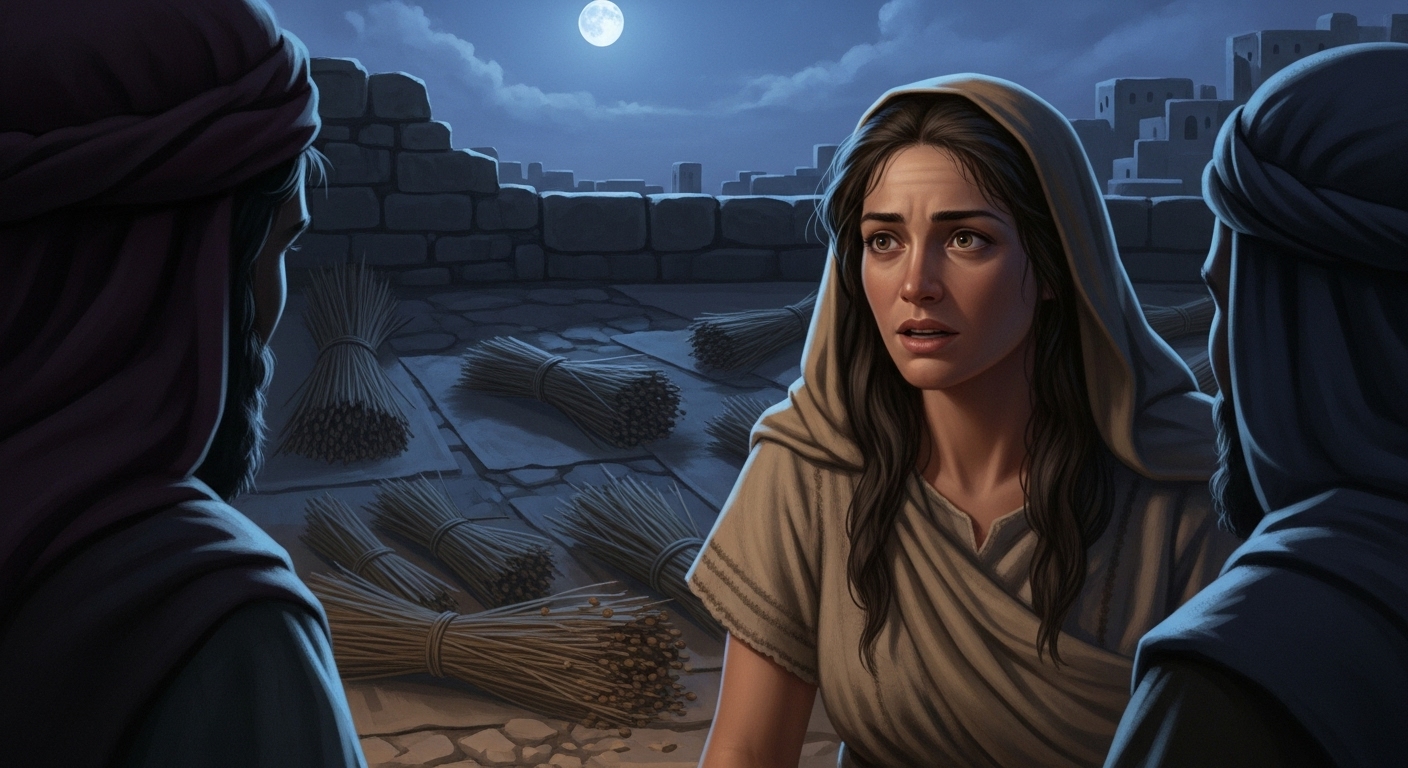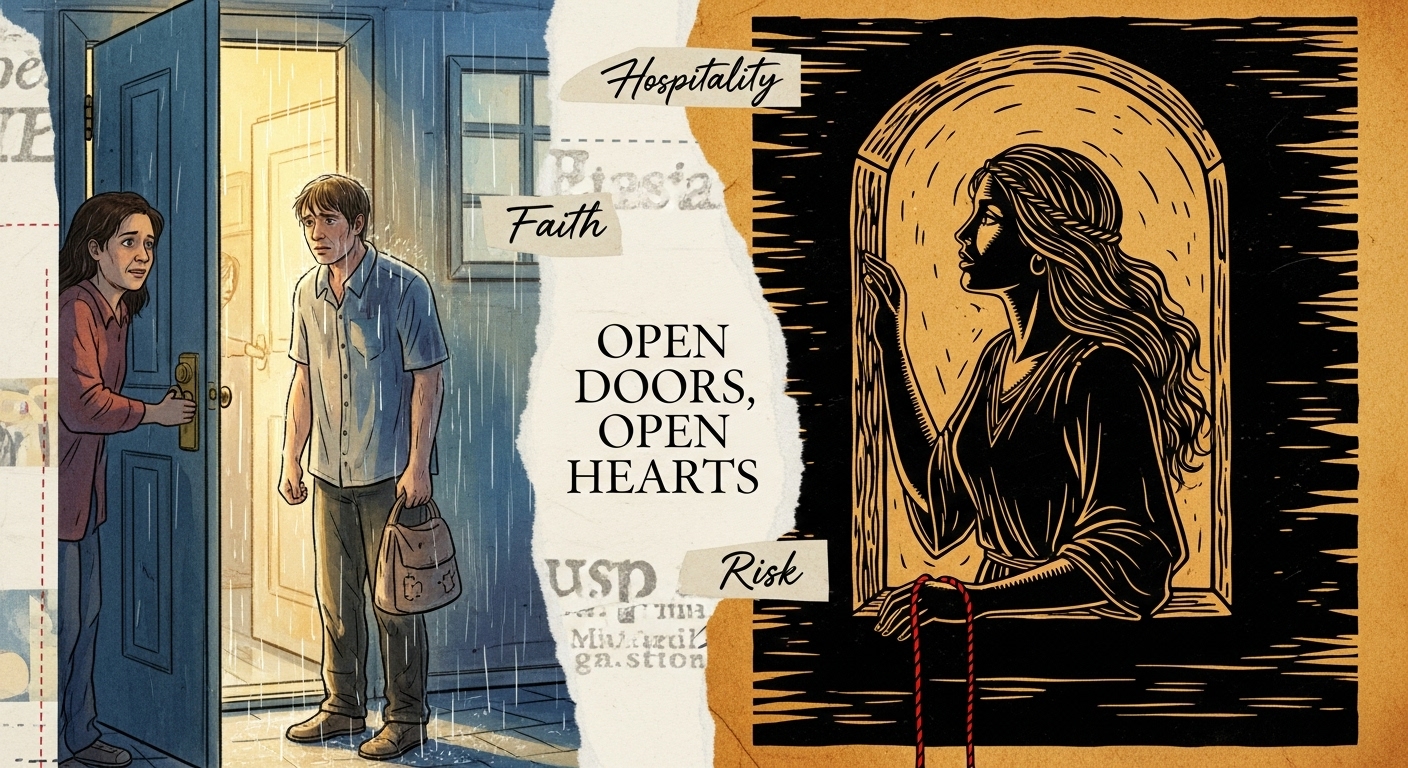Rahab’s Faith – Welcoming The Spies With Courage

Have you ever felt like you were standing at a doorway — literally or figuratively — where everything inside you had to decide whether to open up or shut down? Rahab stands in the Bible as someone who did more than stand: she acted. Her choice to welcome Israel’s spies into her home wasn’t merely hospitality; it was a radical act of faith that changed her life and shaped God’s story. In this article, you’ll explore Rahab’s faith, how it looked in a dangerous moment, and what it means for you when courage and conviction meet real risk.
Introduction
Have you ever been asked to choose courage in a quiet, dangerous moment? Maybe it was a conversation that would change relationships, a choice at work that risked reputation, or a step of faith that felt impossible. Rahab’s story is the ancient map for those exact crossroads. When the spies of Israel showed up at her door, she chose to protect them, hide them, and trust the God they represented — even as a resident of Jericho, an enemy city. Her faith wasn’t theoretical; it was practical, urgent, and costly. That’s why her story still matters: it shows you how faith often looks like hospitality, risk, and decisive action.
The Bible Foundation
Read the passage that anchors everything we’ll talk about: Joshua 2:1–11 (NIV).

Joshua 2:1–11 (NIV) 1 Then Joshua son of Nun secretly sent two spies from Shittim. “Go, look over the land,” he said, “especially Jericho.” So they went and entered the house of a prostitute named Rahab and stayed there.
2 The king of Jericho was told, “Look, some of the Israelites have come here tonight to spy out the land.”
3 So the king of Jericho sent orders to Rahab: “Bring out the men who came to you and entered your house, because they have come to spy out the whole land.”
4 But the woman had taken the two men and hidden them. She said, “Yes, the men came to me, but I did not know where they had come from.
5 At dusk, when it was time to close the city gate, they left. I don’t know which way they went. Go after them quickly. You may catch up with them.”
6 But she had taken them up to the roof and hidden them under the stalks of flax she had laid out on the roof.
7 The men pursued them on the road that leads to the fords of the Jordan, and as soon as the pursuers had gone out, the gate was shut.
8 Before the spies went to bed, she came up to them on the roof
9 and said to the men, “I know that the Lord has given you the land and that a great fear of you has fallen on us, so that all who live in this country are melting in fear because of you.
10 We have heard how the Lord dried up the water of the Red Sea for you when you came out of Egypt, and what you did to Sihon and Og, the two kings of the Amorites east of the Jordan, whom you destroyed.
11 When we heard these things, our hearts melted and everyone’s courage failed because of you, for the Lord your God is God in heaven above and on the earth below.
This passage shows you Rahab at a critical moment: she meets the spies, hides them, and then confesses her conviction that the God of Israel is real. It’s a straightforward narrative and rich with meaning — fear, risk, recognition, and then faith.
Understanding the Core Truth
At its core, Rahab’s Faith teaches that true belief often shows up as brave action. She didn’t only mentally assent to the God of Israel — she protected His people at great personal risk. When you choose to follow God, He eventually asks for tangible steps, not just thoughts or feelings. Rahab opens a door — literally and figuratively — and in doing so, becomes part of God’s redemptive plan. Her faith is evidence-driven: she had heard of God’s acts and chose to trust what she’d heard enough to act.
Going Deeper — The Hidden Meaning
There are layers to Rahab’s courage. She’s called a “prostitute” in the narrative (a label that shaped her social status), yet she stands as a model of faith in Hebrews 11:31 and an example of righteousness in James 2:25. That contrast reveals a profound truth: God’s grace often works through the unexpected and the marginalized. Rahab’s willingness to hide the spies—even after the king’s demand—shows a heart that recognized God’s sovereignty (Joshua 2:9–11). The red cord she later hangs in the window (Joshua 2:18) symbolizes the intersection of faith and obedience; it’s a visible sign that faith can be both private (in the heart) and public (in action). When you connect that to your life, you’ll see God’s invitation to be a courageous, counter-cultural witness even amid fear.

Modern Connection — Relevance Today
What does Rahab’s Faith mean for you in modern life? You live in a world that often rewards conformity and punishes risk. Yet God calls people to acts of hospitality, protection, and trust that can look costly. Maybe you must welcome a person others shun, defend someone at work, or stand up for an unpopular truth. Rahab shows you can be transformed by choosing courage over convenience. Her story also invites you to notice the small ways faith is lived out: a sleepless night hiding strangers, a whispered confession, a visible cord of hope. Those are the tiny acts that can change communities and reroute God’s purposes through your life.
Practical Application — Living the Message

How do you apply Rahab’s example today? Start small and concrete. First, listen for where God nudges you to act — a neighbor in need, a colleague facing injustice, a friend doubting their worth. Second, choose risk in proportion to obedience: it might be a hard conversation, a meal offered, or a prayer. Third, make your faith visible in safe and meaningful ways; a public act of kindness can be a red cord of hope to someone else. Finally, remember that God honors faith expressed in action. When you open your door — your time, home, resources, or voice — you participate in God’s unfolding plan.
Faith Reflection Box
Pause for a moment and ask yourself: When was the last time you took a small but risky step because you believed God was at work? How did that change you?
Key Takeaways:
- Rahab’s Faith shows that belief becomes real when it’s acted upon.
- Courage can come from unlikely places; God uses the marginalized.
- Practical obedience — even small — opens the door for God’s purposes.
- Your visible acts of faith can be a lifeline to others.
Q&A
Q1: Why is Rahab mentioned in Hebrews 11 and James 2? Doesn’t her past disqualify her?
Answer: Rahab’s past doesn’t disqualify her because Scripture focuses on the faith she displayed, not just her history. Hebrews 11:31 honors her because she acted on belief; James 2:25 highlights her works as proof of faith. God’s grace reaches into broken stories and redeems them when people respond in trust and obedience. Her example shows you that faith and works together reflect transformation—and that God often uses imperfect people to fulfill His promises. For a deeper look at transformation stories, you might read this related article: https://biblestorieshub.com/rahabs-legacy-faith-that-still-speaks-today/. Also see Hebrews 11:31.
Q2: Did Rahab only protect the spies because she was afraid of the kings of Israel?
Answer: Fear likely prompted Rahab to act, but her words reveal more: she believed God had already given the land to Israel (Joshua 2:9–11). That belief moved her from fear to faith. Sometimes fear is the beginning of faith if it leads you to recognize God’s power and act accordingly. Your fears can be the soil where faith grows if you turn them into trust and obedience. Remember, Rahab’s action was costly and courageous—not merely self-preserving.
Q3: What does the red cord mean, and how can you apply that symbol today?
Answer: The red cord Rahab hung in her window (Joshua 2:18) became a sign of protection and identification. Symbolically, it reminds you that visible signs of faith matter. Today, you might not hang a cord, but you can cultivate visible marks of allegiance: consistent kindness, public testimony, or reliable hospitality. These are modern red cords that let others identify that you’re someone who trusts God and acts accordingly.
Q4: Can you expect the same dramatic outcomes Rahab saw when you act in faith?
Answer: Faithful action doesn’t guarantee identical outcomes; God’s ways aren’t formulaic. Rahab’s story led to protection, inclusion in Israel, and an eventual place in Jesus’ genealogy (Matthew 1). Your faithful steps might lead to unexpected blessings, or they might create quiet spiritual growth. The promise is not always about a specific result but about God honoring obedient faith and using it for His purposes. Trust the process and remain faithful even when outcomes differ from expectations. For a Scripture that reminds you of God’s faithful working, consider Romans 8:28 via Bible Gateway: Romans 8:28.
Conclusion & Reflection
Rahab’s Faith invites you into a picture where courage, hospitality, and belief intersect. She teaches you that faith is often messy, risky, and surprising — and that God delights in redeeming those who step forward in trust. As you reflect, remember that God sees the small, brave acts you perform in His name. He can use them in ways you can’t imagine.
A short prayer: Lord, give me the courage of Rahab — help me to act in faith when fear whispers otherwise. Open my hands and my home to those who need hope, and make my visible acts of obedience a bridge for Your grace. Amen.

More Inspiration Awaits — Read These Next
👉 For deeper insight into Isaiah 40:31 and how it renews your strength in both faith and daily life
👉 For practical lessons on compassion and neighborliness from the Good Samaritan
👉 For a clear explanation of what we can learn from the Parable of the Good Samaritan
👉 For meaningful insights from the Parable of the Pearl and its hidden treasures
👉 For a deeper look at the Rich Man and Lazarus and what it reveals about the afterlife
👉 For guidance on the Parable of the Ten Virgins and preparing for God’s Kingdom
👉 For clarity on the Parable of the Lamp and how it calls us to shine our light
👉 For insights from the Parable of the Wedding Feast and the meaning behind the invited guests

📘 Jesus and the Woman Caught in Adultery – Grace and Mercy Over Judgement
A powerful retelling of John 8:1-11. This book brings to life the depth of forgiveness, mercy, and God’s unwavering love.
👉 Check it now on Amazon 🛒💥
🔥 “Every great message deserves a home online.” 🌍💬🏡
Don’t let your calling stay hidden. Start a Christian blog or website using Hostinger — with 99.9% uptime, a free domain, and SSL, your voice can shine for God’s glory anytime, anywhere.
💥 Begin today. 🛒 Try it RISK-FREE! ✅
✝️ “Your body is God’s temple — care for it with purpose.” 💪💖🏛️
Renew your energy and restore balance naturally. Mitolyn helps support a healthy metabolism, giving you the vitality to live out God’s calling with strength and confidence.
🔥 Unlock Your Metabolic Power! ⚡Burn More Calories & Feel Great With Mitolyn. 💪
👉 Start Today. 🚀 Check Price Now. 🛒💰
💰 As a ClickBank & Amazon Affiliate, I earn from qualifying purchases.
📖 Acknowledgment: All Bible verses referenced in this article were accessed via Bible Gateway (or Bible Hub).
🚀 Want to explore more? 👉 Dive into our new post on Why Jesus? and experience the 🔥 life-changing truth of the Gospel!








